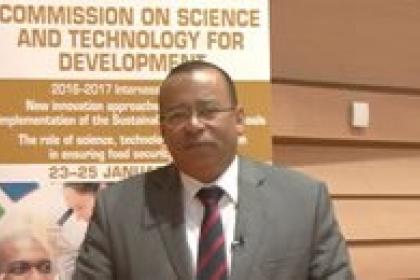In 2015, the General Assembly in its resolution 70/125 requested the Chair of the Commission for Science and Technology for Development, through the Economic and Social Council, to establish a working group to develop recommendations on how to further implement enhanced cooperation as envisioned in the Tunis Agenda, with the full involvement of all relevant stakeholders.
The CSTD Working Group on Enhanced Cooperation (WGEC) held five meetings between September 2016 and January 2018. The complexity and political sensitivity of the topic did not allow the working group to agree on a set of recommendations.
Events and Meetings
- Note on Membership
-
Pursuant to UN GA resolution 70/125 which requests the Chair of the Commission on Science and Technology for Development through the Economic and Social Council, to establish a working group to develop recommendations on how to further implement enhanced cooperation and on the basis of the notes dated the 26 January 2016 and 3 March 2016 and the consultations undertaken in this context, the Chair of the CSTD hereby decides that the Working Group on Enhanced Cooperation will be composed of:
Member StatesAfrican Regional Group
- Central African Republic
- Republic of Kenya
- Republic of Liberia
- Tunisia (host of the World Summit on Information Society)
- Republic of Zambia
Asia-Pacific Regional Group
- India
- Iran (Islamic Republic of)
- Japan
- Pakistan
Eastern Europe Regional Group
- Bulgaria
- Hungary
- Poland
- Russian Federation
Latin America and Caribbean Regional Group
- Brazil
- Cuba
- Mexico
- Peru
Western Europe and Other States Regional Group
- Canada
- Switzerland (host of the World Summit on Information Society)
- Turkey
- United Kingdom and Northern Ireland
- United States of America
StakeholdersThe Chair also invites the following stakeholders to interactively participate in the Working Group:
Representatives from the business community
- Mr. Jimson Olufuye, Africa Information & Communication Technologies Alliance (AfICTA)
- Mr. Lorenzo Sastre, Asociación Interamericana de Empresas de Telecomunicaciones (ASIET)
- Ms. Timea Suto, ICC Business Action to Support the Information Society (ICC BASIS)
- Mr. Makoto Yokozawa, Japan Information Technology Service Industry Association (JISA)
- Ms. Marilyn Cade,CEO of mCADE
Representatives from civil society
- Anriette Esterhuysen, Executive Director, Association for Progressive Communications (APC)
- Parminder Singh, Executive Director, IT for Change
- Lea Kaspar, Global Partners Digital
- Carlos Afonso, Executive Director, NUPEF Institute
- Richard Hill, Association for Proper Internet Governance (APIG)
Representatives from the technical community and academia
- Mr. Nick ASHTON-HART, Consultant in international Internet related public policy and Associate Fellow, Geneva Centre for Security Policy
- Ms Constance BOMMELAER, Senior Director, Global Internet Policy, the Internet Society
- Mr. Nigel HICKSON, Vice-president, UN and NGO Engagement, ICANN
- Mr. Janvier NOULAYE, ICT Teacher, IT Manager & Consultant, University of Yaoundé
- Dr. Jovan Kurbalija, Director DiploFOundation
Representatives from the intergovernmental and international organizations
- European Union
- International Telecommunication Union (ITU)
- United Nations Economic and Social Commission for Western Asia (UNESCWA)
- United Nations Educational, Scientific and Cultural Organization (UNESCO)
- United Nations Human Settlements Programme (UNHABITAT)
Geneva, 2 May 2016
Peter Major, Chair, CSTD


